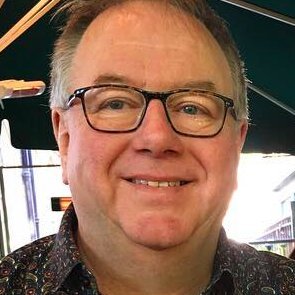"The unusual band sound of Trioscapes makes it difficult to market it, but that’s cool,” says their bass guitarist Dan Briggs. “We feel that we are more in our world now than we were with the first album, Separate Realities, which felt kind of like a weird metal hybrid, but now we feel comfortable with fusion music.”
Trioscapes formed, in fittingly unusual circumstances, in 2011. Briggs – better known as the bass player for progressive metallers Between The Buried And Me – booked a gig for a friend in his home town of Greensboro, North Carolina, and needed a support band. He knew drummer Matt Lynch, who had played in “Tool-inspired bands”, and saxophonist and flautist Walter Fancourt, who shared his love of ’70s fusion, Zappa and prog. They had talked about playing together, so now was the ideal time to give it a go. The trio immediately raised the bar stratospherically high by deciding to learn Mahavishnu Orchestra’s Celestial Terrestrial Commuters, from their 1973 album Birds Of Fire, for this debut performance.
“None of us really knew how to play it, but we bastardised it, then made it our own,” Briggs says. “After that song, we worked up 25 minutes of music for this show. That music all pretty much made it on to the first record.”
It’s so easy for listeners to assume that there must be a grand scheme behind a group’s creations, or at least a conceptual framework, but when speaking to Briggs, what comes over strongly is how surprised he is by his own creation. It was a leap into the unknown as the group had no idea how it was going to sound, or even who to compare themselves to. There was no thinking beyond the first show, but the chemistry was potent from the start. “Since that moment, it’s just been on,” he says.
Briggs is, however, a little taken aback by how, despite the musicians having little or no grounding in jazz, Trioscapes’ 2012 debut album Separate Realities somehow made it to Number 12 on the Billboard Current Jazz Chart, and, amazingly, Number Nine in the Traditional Jazz Chart. This seems like a classic case of labelling difficult music as jazz by default, simply because it doesn’t fit into any other pigeonhole.
“We were laughing about that,” Briggs recalls. “‘Traditional jazz’ – that’s hilarious! Those people don’t want to listen to Trioscapes with John Zorn-esque shrieking saxophone and gnarly bass in their faces – it’s not quite as brutal, but we listened to that shit, like Painkiller and Naked City. But if it lands on that chart, that’s great.”
The strength of Trioscapes’ approach is that they use complex written passages as launch pads for spells of improvisation. Briggs explains how they put their music together: “It’s definitely a mix. For some songs, like Digital Dream Sequence and From The Earth To The Moon, I brought in full charts with sax or flute melodies. That’s what’s interesting in meshing our backgrounds as me and Matt come from the rock/metal thing, where it’s highly composed music, but Walter is also into Afrobeat, psychedelia and freak funk, so he’s much freer and on the spot.
“Some of the songs, like Hysteria and moments of The Jungle, just kind of happened. I love that because I live in such a densely composed world with all my groups, it’s so fun to have those free moments. That never happens in Between The Buried And Me writing sessions. We never just get together and see what happens as that would just be an unmitigated disaster.”
The group have a far wider sound palette than their basic instrumentation might imply. Lynch plays tabla, tuned percussion and keyboard samples on a rack of eight pads. Fancourt’s saxes and flutes are echoed and treated – almost to oblivion on the title track – while Briggs uses distortion and a pitch shifter to allow him to play in a higher register with Fancourt’s reeds, or to delve deep into a positively road-digging low-end sound.
With Fancourt playing flute, From The Earth To The Moon feels like a deliberate cooling down of the band’s typically fiery approach.
“It was kind of a breather track,” Briggs agrees. “We wanted to bring in some of our Can/krautrock influences into that song.”
Briggs, a classically trained double-bassist, reveals that the end section of the piece is inspired by “the master”: JS Bach. “I wanted to do some Baroque-esque counterpoint and so a quasi-fugue builds between four different voices. That song was a fun step forward. I don’t think there was anything that sounded like that on our first record.”
However you categorise Trioscapes’ particular brand of fusion, it’s certainly selling, and Separate Realities peaked at Number Two on the US iTunes jazz chart.
“We were excited about it. Now we’re thinking, ‘Let’s reach out to that world a little more.’ We do get attention from the 40-plus crowd, which is nice – although most of our audience is younger – but when they come out, they’re psyched! They are people like my dad who saw Zappa in the ’70s, and Gentle Giant. That’s so cool, and I think this magazine is a great spot for those people to find out what’s going on.”
On the subject of this publication, I mention that in the Prog poll to find the all-time 100 greatest prog albums, Between The Buried And Me scored two entries: The Parallax II came in at No. 63 and Colors at No. 45. “That’s great,” says Briggs. “We don’t always invest a lot in what the press has to say, but the magazine is so fucking cool.”
So maybe Trioscapes might appear in future Prog polls? “It doesn’t get to tour as much as Between The Buried And Me, but any music I’m a part of is no less important than any of the other projects,” says Briggs. “And the live situation with this group is unlike anything that I’ve ever had. Even though we’re playing such intense and daunting music in Trioscapes, we’re vibing off each other’s energy and feeling a different spark every night. And when we’re really on, it’s one of my favourite feelings ever.”
Digital Dream Sequence is out now on Metal Blade. See www.facebook.com/trioscapes.com for more information.


